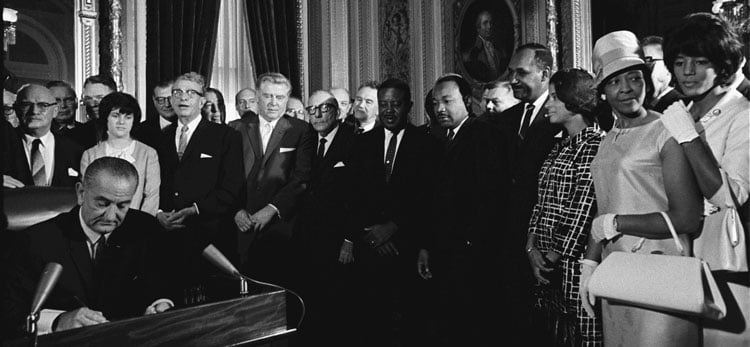DOJ files suit contending Georgia election law violates Voting Rights Act

President Lyndon B. Johnson signs the Voting Rights Act of 1965. Photo courtesy Wikimedia Commons/Yoichi Okamoto.
The U.S. Department of Justice announced Friday that it filed a lawsuit challenging new voting procedures in Georgia as a violation of the Voting Rights Act.
The suit alleges that Georgia Senate Bill 202, signed into law in March, included procedures intended to deny or abridge the right to vote on account of race. The law is known as the Election Integrity Act.
U.S. Attorney General Merrick Garland announced the filing of the lawsuit in a press conference. A press release is here, and a fact sheet is here.
The Washington Post, CNN, Politico, the New York Times and BuzzFeed News have coverage.
Garland said Georgia experienced record voter turnout in the 2020 election cycle, which should be “cause for celebration.” Instead, Georgia lawmakers passed a bill that made it harder to vote, he said.
Garland also announced a task force Friday that will address rising threats to election officials.
The suit, filed in the Northern District of Georgia, says the bill was passed at a time of a dramatic increase in absentee voting by Black voters and heavily publicized Black voter mobilization efforts.
Among the provisions targeted in the suit:
• A ban on government entities distributing unsolicited applications for absentee ballots.
• Fines imposed on groups that distribute follow-up absentee ballot applications.
• A shortened deadline to request absentee ballot applications.
• A requirement that those without a driver’s license must photocopy another form of ID to request an absentee ballot.
• Limits on use of drop boxes for absentee ballots.
• A ban on providing food or drinks to people in voting lines.
• A ban on counting out-of-precinct provisional ballots cast before 5 p.m. on Election Day.
Garland said the Georgia voting law would likely never have taken effect if the U.S. Supreme Court had not effectively eviscerated Section 5 of the Voting Rights Act eight years ago in Shelby County v. Holder. Section 5 required jurisdictions with a history of race discrimination in voting get preclearance from the DOJ before enacting significant election changes.
Garland urged Congress “to restore this invaluable tool.”
The DOJ’s suit alleges violation of Section 2 of the Voting Rights Act, which bans voting practices or procedures that discriminate on the basis of race, color or language.
CNN points out that a pending Supreme Court case, Brnovich v. DNC, involves another Section 2 challenge to an Arizona voting law brought by the Democratic National Committee. The Arizona law rejects ballots that are cast in the wrong precinct and limits the people who can deliver another person’s ballot to a polling place. A decision in Brnovich could come next week.
Republican Georgia Gov. Brian Kemp responded on Twitter that the Biden administration and Democrats “are weaponizing the U.S. Department of Justice to carry out their far-left agenda that undermines election integrity.”



